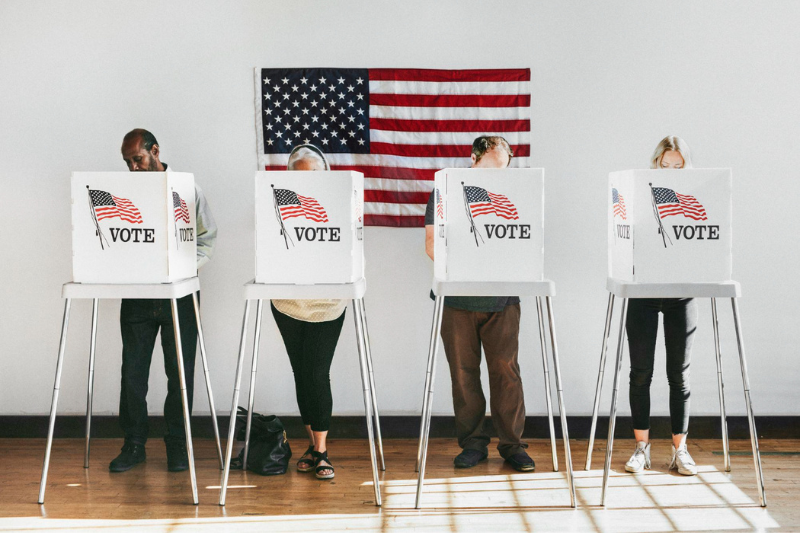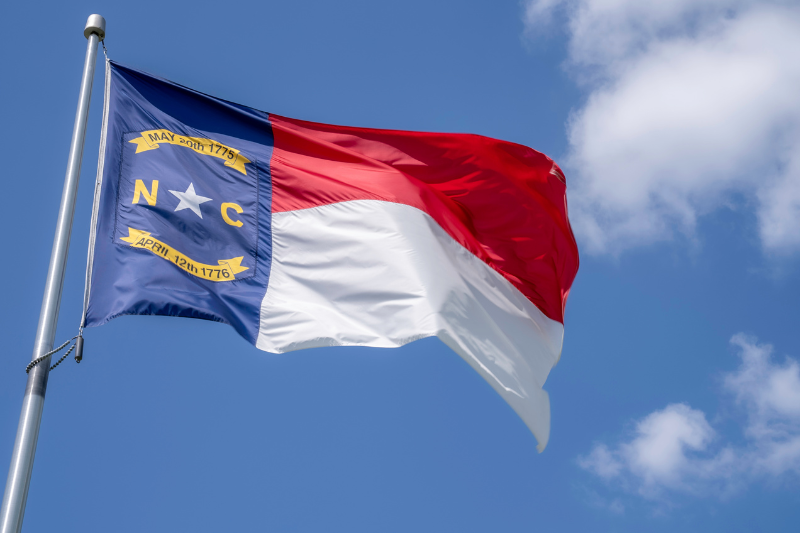Key Takeaways
- Canadians have the lowest engagement with New Year’s resolutions, with only 43% making resolutions and many Canadians not believing in their efficacy.
- UK respondents have limited optimism and tend to set larger, more ambitious resolutions compared to other countries.
- Americans have strong commitment and belief in resolutions, with over two-thirds making resolutions each year and a majority successfully completing past resolutions.
- Across all countries, there is a preference for continuous improvement and making small, sustainable changes over time when it comes to resolutions.
In this Article
- Canadian Perspective: Fewer Resolvers with Lower Engagement
- The U.K. Outlook: Limited Optimism and Discrete Resolutions
- The American Perspective: Strong Resolution Commitment and Belief
- Overcoming Obstacles and Embracing Sustainable Change
- Reflections on the Persistence of Resolutions
Every year, as the clock strikes midnight on December 31st, millions of people around the world embrace the tradition of setting New Year’s resolutions. These goals represent a fresh start, a chance to improve ourselves and make positive changes in our lives. But do these resolutions truly lead to lasting change? A recent omnibus survey conducted by Sago delved deep into the minds of respondents from the U.S., U.K., and Canada to uncover their thoughts, feelings, and habits when it comes to New Year’s resolutions. Let’s take a closer look at the key findings and explore how different countries approach this annual tradition.
Access All Stats & Findings from Sago’s Survey on New Year’s Resolutions
The Canadian Perspective: Fewer Resolvers with Lower Engagement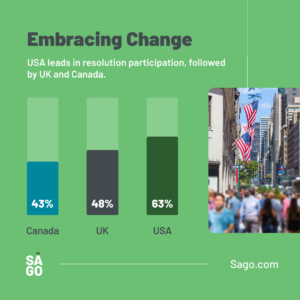
Among the three countries surveyed, Canada emerged as the nation with the lowest engagement with resolutions. According to the data, only 43% of Canadians make resolutions, compared to 48% in the U.K. and a remarkable 63% in the United States. This low participation rate could be attributed to the fact that nearly half of Canadians surveyed do not believe in the efficacy of resolutions in motivating behavioral change.
Notably, Canadians who do make resolutions tend to keep them private. The survey revealed that Canada had the highest proportion of respondents who intended not to share their resolutions with friends or family, accounting for 65% of respondents. Additionally, almost half of Canadian resolvers would prefer not to seek help in achieving their goals, emphasizing their self-reliance and privacy.
The U.K. Outlook: Limited Optimism and Discrete Resolutions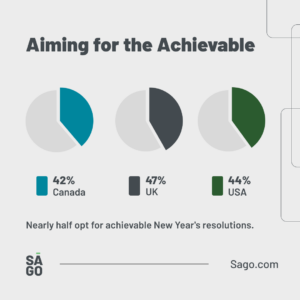
When it comes to optimism about resolutions, the U.K. respondents displayed the least amount of confidence. Among those who made resolutions, the data revealed that individuals from the U.K. anticipated giving up on their goals the earliest, typically by mid-February. In contrast, respondents from both Canada and the U.S. expected their resolutions to last slightly longer, hopefully into March.
Furthermore, the survey indicated that U.K. respondents were more likely to set larger, ambitious resolutions compared to their counterparts in Canada and the U.S. A significant 16% of respondents in the U.K. sought to tackle substantial life changes, while 11% aimed to achieve business-related resolutions. Though still a minority, these numbers exceed those of Canada or the U.S., shedding light on the UK’s desire for impactful change.
The American Perspective: Strong Resolution Commitment and Belief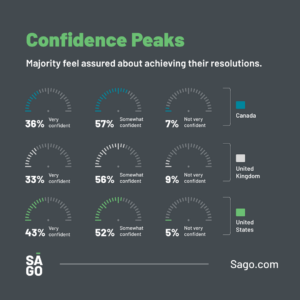
It comes as no surprise that Americans are known for their enthusiasm when it comes to New Year’s resolutions. The survey found that over two-thirds of Americans make resolutions each year, exhibiting a higher engagement than their U.K. and Canadian counterparts. What’s more, Americans are strong believers in the efficacy of resolutions. Over 75% of respondents in the U.S. reported having successfully completed a resolution in the past, demonstrating a strong belief in the power of resolutions to drive behavioral change.
Americans also stand out when it comes to commitment. The data revealed that they were more inclined to stick to their resolutions the longest, with their goals often lasting until mid-March. Additionally, when faced with obstacles, Americans were more open to tracking their progress and earning external support from friends or family members, emphasizing their determination to achieve their goals.
Overcoming Obstacles and Embracing Sustainable Change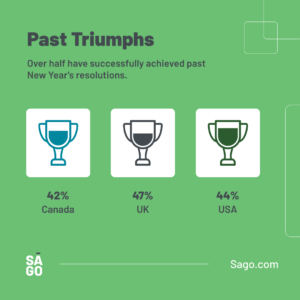
Across all surveyed countries, temptations and a lack of motivation were identified as the primary obstacles to achieving resolutions. As for tracking progress, digital tools were not extensively used, with less than a fifth of respondents utilizing apps or online platforms. Most preferred traditional methods, such as writing progress down on paper or through journaling.
Interestingly, the survey unveiled a shared preference for continuous improvement and making small, sustainable changes over time. This sentiment was expressed by a significant majority of respondents from Canada (71%), the U.K. (61%), and the U.S. (69%). It seems that people from all three countries recognize the potential of incremental progress as the key to long-term success.
Reflections on the Persistence of Resolutions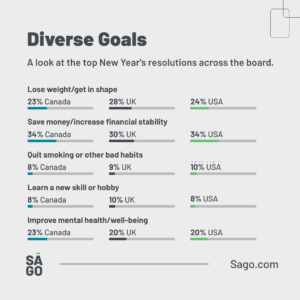
As we reflect on these survey findings, it becomes clear that while New Year’s resolutions are a global phenomenon, the mindset toward them varies across countries. Canadians exhibit a lower engagement and skepticism, while Americans are driven and confident in their resolutions. The U.K. strikes a balance between ambition and realistic expectations.
Regardless of these differences, the survey indicates that continuous, small changes are overwhelmingly preferred by respondents. This approach aligns with the notion that long-lasting transformation requires patience, consistency, and the willingness to adapt.
Methodology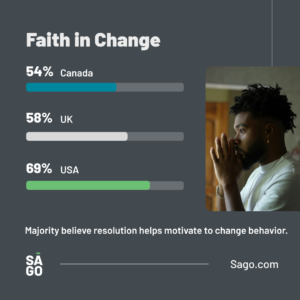
These findings are from an omnibus study released by Sago among a random selection of 1,637 Canadian adults; 2,233 UK adults ages 18+, and 1,545 US adults ages 18+ who are online panelists of Sago’s Community. The Canadian study ran between Jan. 8 – 12, 2024; the UK and US studies were conducted Jan. 5 – 8, 2024.
The results were weighted by age, gender, region, and social Grade to match the population, according to Census data. For comparison purposes, a probability sample of this size has an estimated margin of error (which measures sampling variability) of +/- 2.5%, 19 times out of 20. Discrepancies in or between totals when compared to the data tables are due to rounding. Excerpts from this release of findings should be properly attributed, with interpretation subject to clarification or correction.
Sago is the global research and data partner that connects human answers to business questions. Combining a legacy of impact, global reach, and innovative spirit, Sago enables clients to solve business problems through extensive audience access and an adaptive range of qualitative and quantitative solutions.




 6 Minutes
6 Minutes 





